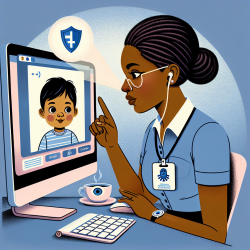As speech therapists, our primary goal is to support and nurture the communication skills of children. With the rise of online therapy services, ensuring the safety of our young clients has become more crucial than ever. Here at TinyEYE, we take safety seriously and want to share some key practices to help you create a secure and joyful online therapy environment.
1. Secure Platforms
Using secure and encrypted platforms is non-negotiable. Make sure the software you use complies with privacy laws and provides a safe space for children to interact. At TinyEYE, our platform is designed with security features that protect client data.
2. Parental Involvement
Engage parents or guardians in the therapy process. Their presence not only ensures an extra layer of safety but also helps in reinforcing therapy goals at home. Always keep them informed about session times and progress.
3. Clear Communication
Maintain open lines of communication with both the child and their parents. Clear guidelines about what is expected during sessions can prevent misunderstandings and ensure everyone feels safe and comfortable.
4. Regular Check-Ins
Schedule regular check-ins with parents to discuss any concerns or observations. This ongoing dialogue helps in identifying any potential safety issues early and addressing them promptly.
5. Training and Resources
Stay updated with the latest training and resources on online safety. TinyEYE offers continuous professional development opportunities to help our therapists stay informed about best practices in online therapy.
By incorporating these practices, we can create a safe and supportive environment that allows children to thrive in their online therapy sessions. Safety is not just a requirement; it's a commitment to the well-being of the children we serve.
We hope these tips bring you joy and confidence in your online therapy practice. Together, we can make a difference in the lives of the children we work with.










